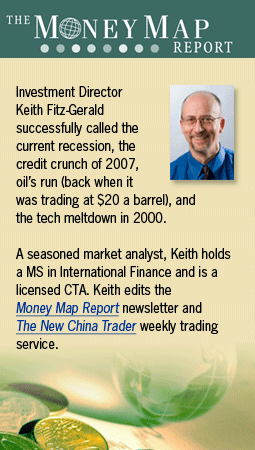By Keith Fitz-Gerald
Investment Director
Money Morning/The Money Map Report
For all their talk about change, the ultimate irony in today's markets is that Washington is so afflicted with legislative gridlock that the "Beltway Boys" couldn't "change" the channel on their flat-screen televisions.
And yet, as frustrating as legislative gridlock is for many voters (myself included), the data suggests that politicians’ inability to act might actually be good for the markets.
The bottom line: Legislative gridlock translates into higher profits for investors.
We realize that this runs contrary to the conventional wisdom on the subject but, as we point out so frequently, sacred cows frequently make the best burgers.
Our proprietary research suggests that markets tend to run in long cycles averaging 17-21 years in length, while the White House political cycle runs in eight-year increments - at best. That means the political cycle is considerably shorter than dominant market cycles.
Our takeaway: In the long run, there’s really no correlation between who holds the White House and successful long-term investing because the political and market cycles are rarely in sync over such disparate periods.
Are the results any different in the short run?
Nope. Here, too, the data suggests that it doesn’t really matter which political party is in control really doesn't matter (a conclusion that’s supported by the accompanying chart, which includes data from Ned Davis Research and some analysis by Money Morning).
What this data demonstrates is that the stock market’s highest performance (a 9.6% growth per annum) occurs when there's the most political turmoil - in short, a Democratic president and a Republican Congress.
That suggests a finding that's so surprising we weren't sure we believed our eyes either: The Dow Jones Industrial Average Index logs its biggest net gains with a donkey in the White House and elephants traversing the halls of the U.S. Capitol Building.

Another interesting conclusion suggested by our own research, and that of other firms such as Ned Davis, is that in stark contrast to what most investors believe to be true - that Republicans are better for the markets - is that the blue-chip-dominated Dow tends to rise nearly twice as fast during Democratic presidencies (7.2%) as it does during Republican ones (3.8%).
The great equalizer, if there is one, appears to be inflation, which rapidly eats away the higher returns to bring them within a few basis points of each other over time.
People assume that a presidential administration and Congress with matching political affiliations is the best way to get things done, but in reality, the checks and balances of a mismatched pair helps to ensure that governmental agendas don’t go to extremes. Thus, somewhat surprisingly, political gridlock is actually a reality that puts investors at ease and permits the financial markets to operate efficiently.
With regard to the elections set for this fall, we see two potential outcomes:
- If U.S. Federal Reserve Chairman Ben S. Bernanke fails in his current efforts to strike a balance between inflation at one extreme and recession at the other, the incoming president will inherit a long-drawn-out economic slowdown (and possibly even an era of stagflation). If that happens, history suggests an environment that’s conducive to a Democratic president and, strangely enough, a Republican Congress. It also suggests that we'll see more downside ahead before things become "gridlocked" enough that we can enjoy the historically documented 5.6% net increase noted in our chart.
- If, however, Bernanke's "Hail Mary" recovery pass is successful, and we avoid a full-blown recession (which seems more doubtful by the day), the historical election-year patterns suggest a brief decline followed by a strong fourth-quarter rally. That would mean that the worst of what the stock market can bring to bear could already be behind us.
Psychologically, we're just as likely as most readers to hope for good markets and a clean political environment; after all, having the two together just flat out makes one feel better. But in our most candid moments we realize we must get read for the opposite - especially now that the Fed and the Beltway Boys are tripping over one another in an effort to regulate "free" markets.
We wish the politicians would focus on something else, especially since the data suggests that their doing so is "good" for the markets.
Never mind the lies we tell ourselves about elections and our money; sometimes the truth is stranger than fiction.
News and Related Story Links:
- Money Morning:
Election 2008: Obama or McCain - U.S. May Suffer Either Way.
About the Author
Keith is a seasoned market analyst and professional trader with more than 37 years of global experience. He is one of very few experts to correctly see both the dot.bomb crisis and the ongoing financial crisis coming ahead of time - and one of even fewer to help millions of investors around the world successfully navigate them both. Forbes hailed him as a "Market Visionary." He is a regular on FOX Business News and Yahoo! Finance, and his observations have been featured in Bloomberg, The Wall Street Journal, WIRED, and MarketWatch. Keith previously led The Money Map Report, Money Map's flagship newsletter, as Chief Investment Strategist, from 20007 to 2020. Keith holds a BS in management and finance from Skidmore College and an MS in international finance (with a focus on Japanese business science) from Chaminade University. He regularly travels the world in search of investment opportunities others don't yet see or understand.



